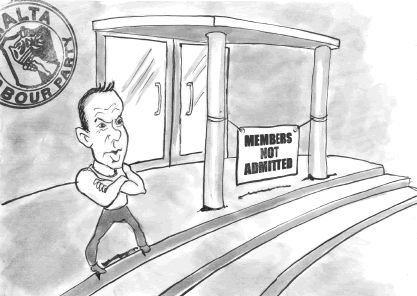
| EDITORIAL | Sunday, 11 May 2008 A lost opportunity
The decision by the Labour party delegates not to extend the leadership electoral college to include the 19,000 members is a lost opportunity, carrying political consequences for the party in Opposition.
Limiting a crucial decision to 900 delegates, rather than opting for a wider membership base, limits the broader base appeal that the new leader could have acquired and certainly should be aspiring to achieve. While not disputing the right of the party delegates to decide the rules of the game, good political sense would nonetheless dictate that, after three consecutive electoral defeats, an American system of primaries would not only have been a welcome novelty in Maltese politics, but would also have given the new leader immediate popular backing. It would have legitimised him or her in the eyes of the electorate allowing him to hit the ground running with the necessary approval ratings and grass root backing. This is especially relevant when the two front runners for the June 5 election will most likely not be members of parliament, and will have to be co-opted. A widening of the Electoral College would also have been in synch with popular sentiment, which regrettably Labour all too often has a tendency to defy, as in the European membership issue. We say this because we believe that the election of the leader of Malta’s second most important political party must appear as carrying a vast approval rating from the widest electoral base possible, especially since to win the next election, the new leader needs to be more than just the choice of the delegates. He or she must also be the choice of the majority of the electorate. This legitimacy would have served as a good foundation for a truly new beginning: to get the party into shape in order to win electoral approval - all the more important in the context of elections now being presidential contests. Having said this we do recognize that the implementation of a widening electoral college would have created logistical and mechanical nightmares for the party administration. Organizing an electorate of 19,000 people is no easy task, carrying all the ramifications of a local council election in a town the size of Mosta. There was the risk of a free-for-all favouring lavish electoral spending with the possibilities of an election running into a second round. While agreeing with the proposal, we cannot but recognize that this matter would have dragged on for too long, to the detriment of both the party, which is presently rudderless, and also the country, which expects a fully efficient opposition party capable of probing issues, and keeping the government on its toes. At the latest, the new leader should have been in place for the opening of the new parliament yesterday. As things have worked out, 5 June risks not being the D-day if the election goes into a second round of voting, giving government a very extended honeymoon period. One intelligent solution was proposed by the Labour committee of Marsaskala, which suggested that the party delegates should elect two out of the five contestants, who would then face each other off in a MLP member-wide election. Unfortunately, the proposal was aborted by its own proponents. Either way, the issue goes far beyond the election of a party leader. It also raises the crucial point of what type of a party is in the making: whether an inward-looking party, or a political movement which looks beyond the confines of its glass house. The work of the new leader is likewise not limited just to constructively opposing the government of the day; it also includes getting the party’s house in order. Everything needs to be rethought and looked at in a dispassionate manner, including opening up the party media, the setting up of focus groups, and listening to various segments of the electorate: especially the middle class, which feels disengaged from the Labour party. We anxiously await the outcome of the post mortem electoral defeat report – yet again long in being finalized – and hope we are not told that the electorate did not understand the party message or that the party had bad communications with the electorate. The reasons for the defeat go far beyond these lame excuses, and lie more with the previous leader’s lack of credibility, unrealistic policies, a totally negative campaign focusing exclusively on allegations of corruption and too little on concrete proposals for change, and an incapability to appreciate the social and economic benefits brought about by EU membership. We sincerely believe that in losing this opportunity, Labour has missed the wood for the trees. Any comments? |
Copyright © MediaToday Co. Ltd, Vjal ir-Rihan, San Gwann SGN 9016, Malta, Europe
Managing editor Saviour Balzan | Tel. ++356 21382741 | Fax: ++356 21385075 | Email
Managing editor Saviour Balzan | Tel. ++356 21382741 | Fax: ++356 21385075 | Email
